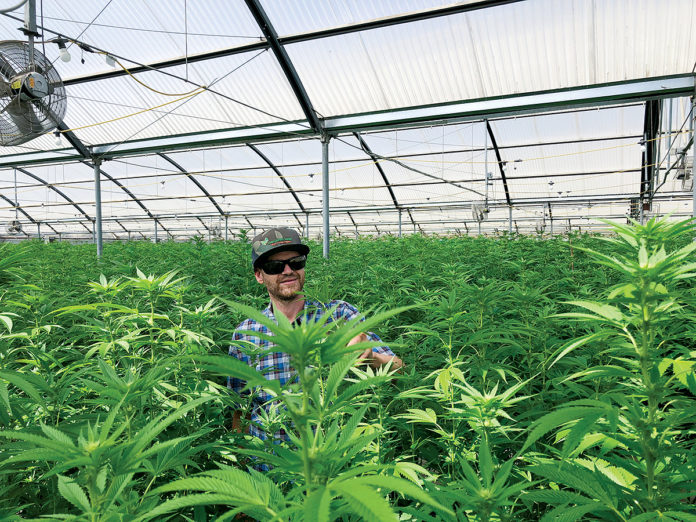Commercial cannabis growers have a responsibility that is not to be taken lightly. With recreational and medical cannabis legalized in many states, more large-scale operations are emerging. Legalization for adult-use cannabis sales is exploding, providing tremendous opportunity for multi-acre facilities.
Consumers increasingly are pushing for organic foods; the trend is seen in the cannabis market, as well. When customers give their trust and hard-earned money to a dispensary, they expect to receive all the benefits this amazing plant delivers. Research and anecdotal evidence indicate cannabis can lower blood pressure, improve digestive issues, ease arthritis pain and improve joint function, lessen the symptoms of multiple sclerosis, assist in cancer treatment, and much more. Cannabis also may help curb the opiate epidemic by easing pain, anxiety, and depression. So, why would anyone not want to use the safest methods for producing a clean end product?
Although growers have an obligation to provide a safe, clean product to consumers, financial backers may pressure their cultivation teams to save money. The problem is, when you cut corners you sacrifice quality and safety. Fortunately, cannabis can be grown organically on a large scale with incredible results.
Aside from minimizing the harmful effects associated with non-organic growing methods, another consideration for producers is their employees. Dedicated farm workers in large-scale facilities deserve a safe environment free of toxic chemicals. Petroleum- and salt-based fertilizers are much more dangerous to apply and otherwise handle than their organic counterparts. That’s part of the reason California requires heavy metals testing of flower, extract, and edibles. It will be interesting to see how this affects cannabis products currently on the market.
Many cannabis companies have reached the conclusion sun-grown organic cannabis with light assist (also known as greenhouse growing) yields the highest-quality product. Terpene profiles and resin content both increase with organic cultivation techniques. Living soil with compost teas and a few “old school” principles always will outshine chemical inputs. At Vital Garden Supply, we have found a few organic ingredients cover all of a plant’s needs.
High-quality soil starts with high-quality compost
Compost may be the most important component of the soil, but not all composts are created equal. Some businesses sell low-cost soil made from waste products instead of properly composted materials, and the same applies to worm castings and humus. The quality of products varies immensely. Do some research and ask for lab reports. If you have access to a microscope, this can be a great asset for observing what’s happening in your soil. The goal here is to have a soil rich in beneficial microbial life.
Fish and kelp feed the soil
Plants love amino acids and minerals, while microbes love fats and oils. Fish hydrolysate has macronutrients (nitrogen, phosphorous, and potassium, or NPK), amino acids, enzymes, and oils. These all benefit the microbes that make nutrients more available to plants. Kelp (Ascophylem nodosum) is an incredible plant food. Plants absorb its minerals, potassium, and vitamin B1, and it also feeds the beneficial microorganisms in the soil. With a healthy population of microbes in the soil, nutrients become more available and plants suffer less disease and infestation.
Guano can increase yield Bat and seabird guanos are an excellent source of NPK. Some guanos also have other minerals such as calcium. Guano is easily broken down by microorganisms; this is why many “old school” growers use guano as their main fertilizer. Guano varies in NPK as well as quality, though. Depending on the source, region, and diet, you will see several different numbers on packaging. For the most part, you want a higher number in the N position for vegetative growth and a higher number in the P position for bloom. K, or potassium, is beneficial throughout a plant’s life, but increased potassium during bloom increases yields. Kelp is a great way to get higher K to your plant and can be mixed with guano.
Minerals are essential
Calcium and magnesium supplements are necessary for healthy plant growth, but cation exchange issues are common in coco-based soil. Reverse-osmosis water also strips calcium, magnesium, and other minerals from plants. Without proper amounts of calcium and magnesium, plants cannot absorb nitrogen. Non-organic calcium and magnesium supplements contain calcium chloride that will kill your biology, but organic calcium and magnesium supplements used regularly will increase cation exchange and ensure there are no deficiencies. Glacial rock powder is a great way to provide slow-release calcium and magnesium as well as trace amounts of cobalt and iron.
Knowledge from experience
I have spent many years touring cannabis farms all over California, Colorado, Washington, and Oregon. The farms that stick to the aforementioned principles have the fewest issues and the most success. Their grow teams are proud of what they do, and team members appreciate their employer caring about them and the end user. Cultivators are comfortable with the products they use and proud to present top-shelf, organically grown cannabis. We work with some of the most successful growers in the country; ultimately the proof is in the final product.
Keeping inputs organic, simple, safe, and affordable makes the difference between a mediocre product and a great one. Cannabis is in the spotlight and merits all its glory, so let’s give the plant the care it deserves.










